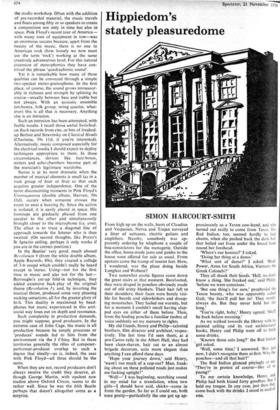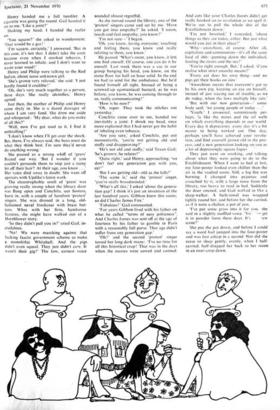Hippiedom's stately pleasuredome
SIMON HARCOURT-SMITH
From high up on the walls, busts of Claudius and Vespasian, Nerva and Trajan surveyed a litter of suitcases, electric guitars and amplifiers. Nearby, somebody was ap- parently ordering by telephone a couple of boa-constrictors for the menagerie. Outside the office, home-made jams and guides to the house were offered for sale as usual. From upstairs came the tramp of tourist feet. How, I wondered, was the place doing beside Longleaf and Woburn?
Two somewhat exotic figures came down the great stairs at that moment. Barefooted, - they were draped in ponchos obviously made out of old army blankets. Their hair fell to their shoulders; their faces were barely visi- ble for beards and sidewlaiskers and droop- ing moustaches. They hailed me warmly, but for a moment I couldn't recall having clap- ped eyes on either of them before. Then, from the leading poncho a familiar timbre of voice suddenly set my memory to rights.
My old friends, Henry and Philip—talented brothers, film director and architect,"-respec- tively. The last time I'd seen them;, at i pro-Castro rally in the Albert Hall, they had been clean-shaven, hair cut to an almost brigade decorum, suits more elegant thin anything I can afford these days.
`Hope your journey down,' said Henry, 'wasn't too much of a cop-out? Man, freak- ing about on these polluted roads just makes me fucking uptight!'
I was beginning, searching round -in my mind -for a translation, when, two girls—I should have said, chicks—came in from the garden. So far is I could see, both were pretty—particularly the one got up ap- proximately as a Texan cow-hand, and who turned out really to come from Texas. The Red Indian, too, seemed hardly to lack charm, when she pushed back the dark hair that belled out from under the broad band round her forehead.
'Where's our hostess?' I asked.
`Doing her thing at a demo.'
`What sort of demo?' I asked. 'Black Power, Arms for South Africa, Vietnam, the Greek Colonels?'
They all shook their heads. 'Hell, we don't know a thing. She freaked out,' said Philip, 'before we were conscious.'
'But one thing's for sure,' prophesied the Texan beauty, who was apparently called Gail; 'the fuzz'll pull her in! They mostly always do. But they never hold her for long.' `You're right, baby,' Henry agreed. 'She be back before morning.' As we walked towards the library with its painted ceiling and its vast architectural books, Henry and Philip went off to fetch some drinks.
`Known those cats long?' the Red Indian 'girl asked. Well, some time,' I answered. 'But, just now, I didn't recognise them at first. Why the ponchos—and all that hair?' The Red Indian glanced pityingly at me. 'They're in protest of course—like all us young!' To my certain knowledge, Henry and Philip had both kissed forty goodbye. But I held my tongue. In any case, just then they came back with the drinks. I stood in need of one.
Henry handed me a full tumbler. A cigarette was going the round. Gail handed it on to me. 'Like a joint?'
Shaking my head. I handed the reefer on.
'You square?' she asked in wonderment. `That would be a gas!'
'I'm square, certainly,' I answered. 'But in this case, it's not that. I didn't take the joint because even when I smoked tobacco, I never learned to inhale; and I don't want to waste your weed!'
Henry and Philip were talking to the Red Indian, about some unknown girl.
'She's grown-very relaxed,' she said. 'I just hardly found it credible!'
'Oh, she's very much together as a person, these days. She really identifies,' Henry agreed. Just then, the mother of Philip and Henry came shyly in. She is a dazed dowager of whom I am very fond. She drew me aside and whispered : 'My dear, what do you make of all this?'
`Well, now I've got used to it, I find it enthralling!'
'I don't know when I'll get over the shock. But, there, I've always said, the boys must do what they think best. I'm sure they'd never do anything wrong.'
She paused as a strong whiff of 'grass' floated our way. 'But I wonder if you couldn't persuade them to snip just a teeny bit off their hair? At their age, you know ...' Her voice died away in doubt. She went off upstairs with Updike's latest work.
The claustrophobic smell of 'grass' was growing really strong when the library door was flung open and Conchita, our hostess, burst in, with a couple of barefoot 'protest' singers. She was dressed in a long, old- fashioned naval frockcoat with brass but- tons. What with her firm, handsome features, she might have walked out of a Hornblower story.
`So they didn't pull you in?' cried Gail, in- credulous.
`No! We were marching against that fucking fascist government scheme to make a monolithic Whitehall. And the pigs didn't even squeal. They ,just didn't care. It wasn't their gig!' The low, earnest voice sounded almost regretful.
As she moved round the library, one of the `protest' singers came and sat by me. 'Have you got into empathy?' he asked. 'I mean, touch-and-feel empathy, you know?'
`I'm not sure—' I began.
'Oh, you know, loving everyone; touching and feeling them, you know and really relating to them, you know.'
He paused. 'What's more, you know, it lets one find oneself. Of course, one can do it by oneself. Last week there was a cat in our group banging his head, you know, on the stone floor for half an hour solid. In the end we had to send for the ambulance. But he'd found himself all right. Instead of being a screwed-up egomaniacal bastard, as he was before, you know, he was coming through to us, really communicating!'
'How is he now?'
'Oh, super. They took the stitches out yesterday.'
Conchita came over to me, handed me inevitably a joint. I shook my head, once more explained that I had never got the habit of inhaling even tobacco.
'Are you sure,' asked Conchita, put out momentarily, 'you're not getting old and stuffy and disapproving?'
'He's not old and stuffy,' said Texan Gail; 'he's groovy; he relates!'
'Quite right,' said Henry, approaching; 'we don't feel any generation gap with you, cat!'
'But I am getting old—old as the hills!' 'The scene is,' said the 'protest' singer, 'you're really broadminded.'
'What's all this,' I asked 'about the genera- tion gap? I think it's just an invention of the last hundred years. Gibbon knew this room; so did Charles James Fox.'
`Fabulous!' Gail commented.
'For years Gibbon lived with his father on what he called "terms of easy politeness". And Charles James was sent off at the age of fourteen by his father to gamble in Paris with a reasonably full purse. That age didn't suffer from any generation gap.'
'Oh!' and the second 'protest' singer tossed her long dark mane: 'I've no time for all this historical crap! That was in the days when the masses were cowed and conned. And cats like your Charles James didn't get really hooked on to revolution as we spell it. We're out to pull the whole shit of the Establishment down.'
'I'm not besotted,' I conceded, 'about things as they are today, either. But just what would you put in their place?'
'Why—anarchism, of course. After all, capitalism and communism—it's all the same load of shit—gunning down the individual, fouling the rivers and the sea!'
'You're right enough. But,' I asked, 'd'you realise what strict anarchy means?'
'Every cat does his own thing—and no pigs get their hooks on him.'
'Anarchism means that everyone's got to be his own pig, keeping an eye on himself, instead of just staying out of trouble, as we do today, when the laws multiply like rats.'
'But with our new generation—' some- body said; 'we young people of today . .
'Youth,' I answered, sententiously per- haps, 'is like the mines and the oil wells on which everything depends in our world. Every day it depreciates: every day it's a bit nearer to being worked out. One day, -perhaps you'll have achieved your revolu- tion, and find yourself grown old in the pro- cess, and a new generation looking on you as a lot of depressingly square fogies ' They just went on smoking, and talking about what they were going to do to the Establishment. When I went to bed at last, my four-poster looked even chillier than the air in the vaulted room. Still, a log fire was burning. I changed into pyjamas and crouched by• it, with a large tome from the library, too heavy to read in bed. Suddenly the door opened, and Gail walked in like a sleep-walker. A bath-towel was wrapped tightly round her, and before her she carried, as if it were a chalice, a pot of jam.
'I've put some grass into it for you. she said in a slightly muffled voice. 'Yo- -,n get
it in powder form these days. It's 'ew scene!'
She put the pot down, and before I could say a word had jumped into the four-poster and was fast asleep in a second. Nor did she cease to sleep gently, evenly, when I half- carried, half-dragged her back to her room in an over-crisp dawn.















































 Previous page
Previous page